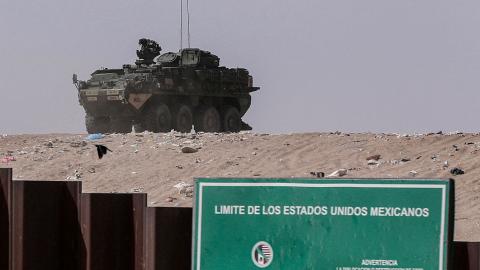
The New York Times detailed that there are now 8,600 active-duty troops and advanced military equipment as part of the Trump administration's effort to deter illegal crossings and confront drug cartels and human smugglers. This represents more than a threefold increase from the approximately 2,500 troops stationed at the border at the end of the Biden administration. President Donald Trump said at the beginning of his term that he wanted for 10,000 troops to be deployed to the border.
The military deployment has included Stryker combat vehicles, U-2 surveillance aircraft, drones, helicopters, and two Navy warships patrolling coastal waters. The mission is being conducted under the Pentagon's Northern Command and is expected to continue for years.
The military's role remains supportive rather than law-enforcement oriented, the report added. Troops conduct foot patrols, operate surveillance platforms, and provide intelligence to civilian agencies. The Trump administration has ruled out invoking the Insurrection Act, which would allow active-duty troops to conduct law enforcement.
Troops do perform some enforcement actions in so-called National Defense Areas in Texas and New Mexico. According to Border Report, federal prosecutors have charged at least 87 individuals with trespassing on Texas' Department of Defense property in just the first week of May.
The arrests follow the rollout of a new National Defense Area (NDA)—a 63-mile-long, 60-foot-wide buffer zone along the Texas border, now under military jurisdiction. The zone stretches from the American Dam in El Paso to Fort Hancock on land that was previously managed by the International Boundary and Water Commission.
Just weeks earlier, the Department of Defense established a 170-mile-long National Defense Area across southern New Mexico, stretching from the Arizona state line to Santa Teresa. There, 82 migrants were arrested in the first week of enforcement, with Border Patrol handling most of the apprehensions.
Civil liberties advocates have warned that the growing presence of military-enforced zones raises red flags for due process and civil rights. They fear that the lack of public transparency and the military's expanded footprint could lead to abuses.
© 2025 Latin Times. All rights reserved. Do not reproduce without permission.





